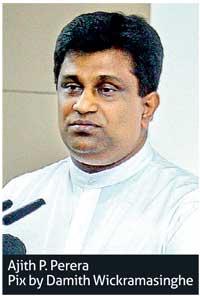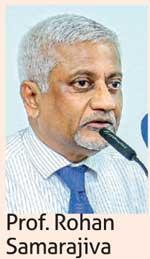08 Aug 2019 - {{hitsCtrl.values.hits}}
By Nishel Fernando
The shortage of Sri Lanka’s information and communication technology (ICT)/business process management (BPM) professionals is projected to widen to 12,140 this year, from a mere 458 in 2013, driven by the sector’s rapid growth, according to the latest IT-BPM Workforce Survey 2019.
The survey showed that the overall strength of the ICT/BPM workforce has grown by 50.7 percent during 2014-2018, with total employment reaching 124,873 in 2018, which is significantly higher than the earlier industry estimate of 85,000 workforce.
Further, the workforce is projected to increase by 16 percent year-on-year to 146,089 in 2019.

“The current situation implies that the demand-supply gap for the ICT workforce in the country is widening rather than closing. Considering the fact that the total supply also includes postgraduate trainees, many of whom may already be counted as part of the existing workforce, this margin tends to increase further,” the authors of the
report stated.
The Information and Communication Technology Agency of Sri Lanka launched the IT-BPM Workforce Survey 2019 report, at the Digital Infrastructure and Information Technology Ministry auditorium, on Tuesday.
Launching the report, Digital Infrastructure and Information Technology Non-Cabinet Minister Ajith P. Perera vowed that the ICT/BPM sector would be a priority sector for the new government, which is set to be formed following the presidential elections later
this year. “Within few months, when we form a government under a new leadership, we will definitely prioritise policies to support the future growth potential, such as ICT/BPM,”
he said. He weighed on formulating policies that encourage the private sector to create world-class graduates to cater to the demands of the ICT/BPM sector.
“It is not possible for the government to cater to this demand through its state-owned higher education system alone. If the government is unable to cater to the demand, we have a responsibility and we must encourage the private sector,” he said. The demand for graduates has increased from 6,246 in 2014 to 21,216 in 2019, with ICT firms accounting for 70.2 percent of the total demand or 14,898 graduates. The survey also reported an increase in the supply of the total number of graduates produced by training institutes from 7,010 in 2014 to 12,307 in 2018, of which ICT major graduates constitute a share of 63.7 percent.
The private sector institutes contributed to a higher share (62.4 percent) of this supply.
With the correct policy mix, Perera opined that the ICT/BPM sector has the potential to become the largest export revenue earner for Sri Lanka by overtaking the tourism, tea and apparel sectors, with the employment in the sector increasing by 150-200 percent over the next few years.
The survey indicated that the ICT companies have become the dominant employers with a share of 65.5 percent of the present workforce, overtaking non-ICT companies (22 percent) by a distant margin, while the government organisations and BPM companies have reported 7.1 percent and 4.2 percent shares, respectively.
The highest demand was placed on software engineering and software quality assurance careers in 2019 align with the current composition of the workforce.
With automation picking up pace globally, a low demand was indicated for the document management service category, which is currently the single largest employment category in the BPM sector. Meanwhile, the demand for emerging technologies was estimated at 5,323, which amounts to 25.1 percent of the total demand for graduates in 2019.The highest demand was recorded for cloud platforms and technologies, followed by mobility platforms and applications, management and technologies and big data platforms and processing and Internet of things commands.
Interestingly, there was no noticeable demand for Artificial Intelligence-based technologies, which has been gaining traction in Sri Lanka.
In terms of gender composition, the ICT workforce remains male-dominant with over 65 percent jobs being occupied by males, although the female workforce has increased from 29 percent in 2013 to 34 percent in 2018.
The lowest share of female employees of 29.4 percent was reported among ICT firms.
According to the Central Bank, the export earnings from telecommunications, computer and information services reached US $ 995 million in 2018 and ICT/BPM firms contributed to US $ 848 million or 85 percent of this income.
The Information and Communication Technology Agency of Sri Lanka (ICTA) plans to develop an advanced centralised platform to exchange information within various government agencies, within six months, in collaboration with private sector professionals.

Digital Infrastructure and Information Technology Non-Cabinet Minister Ajith P. Perera recently announced that his ministry plans to seek the Cabinet approval shortly to design the necessary software for the platform, with the involvement of most qualified IT professionals in the country.
He noted that the platform, which is named ‘National Data Interoperability and Identity Platform’, would be similar to India’s Aadhaar project.
ICTA Chairman Prof. Rohan Samarajiva told Mirror Business that WSO2 founder Dr. Sanjiva Weerawarana is playing a key role in developing the new platform, garnering the support from the private sector.
ICTA also plans to enter into an arrangement with the private sector firms to get onboard their best IT professionals.
“It requires highly skilled professionals to design this platform. We have come up with a novel arrangement with the private sector. We will get the services of the leading experts from the private sector and in exchange, we would reimburse their salaries to their firms,” he said.
Prof. Samarajeewa assured that the necessary safeguards would be in place to ensure the privacy and data security (NF)
15 Nov 2024 8 minute ago
15 Nov 2024 29 minute ago
15 Nov 2024 35 minute ago
15 Nov 2024 41 minute ago
15 Nov 2024 44 minute ago